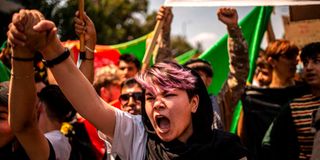Afghanistan: Why Kenyan pullout from Somalia needs deep rethink

Afghans who live in Greece take part in a protest in the capital Athens over the Taliban takeover of Afghanistan on August 18.
Plato opined that “...when people make a wrong choice of pleasures and pains — that is, of good and evil — the cause of their mistake is lack of knowledge.”
Two decades ago, the United States approved deployment of troops in what was considered an invasion of Afghanistan, ostensibly to counter the danger posed by Taliban. This was in the backdrop of a major terrorist attack to ever occur on US soil. With time, the presence of US and allied troops in Afghanistan was highly visible.
Some semblance of sanity and order was evident, particularly the foundation of democratic spaces, setting up of new governance structures, installation of rule of law, respect of human rights and justice mechanisms among other advances started being entrenched in every day’s life.
In his last term, President Donald Trump decreed a pullout from Afghanistan by May this year. His successor, President Joe Biden, was recently quoted as saying he couldn’t pass the responsibility to another leader.
Negotiating position
In an unprecedented flow of events, between January and June, Taliban’s troops got wind of the tactical withdrawal and, hence, a lacuna and vacuum left by the soldiers and, one by one, restrategised and captured province after another. Kabul finally fell on August 15. This saw the President voluntarily cede power and immediately escaped the country to avoid facing the wrath of the Taliban. He however stated that he did this to avoid bloodshed.
In mid-2019, Kabul must have missed the increasing activity of Taliban in the north as nothing more than a ploy to improve their negotiating position. The denial of the ever-expanding Taliban footprint was compounded by a touching belief that the Americans will never abandon Afghanistan.
There was also the misplaced confidence that Taliban would not sweep through the Asian country as they did in the 1990s. It wasn’t only Kabul that was guilty of this; members of the international community, including the Americans and their military, kept painting a fairly rosy, and entirely misleading, picture of the situation.
Stabilise the delicate peace
A decision by the Kenyan government a decade ago to deploy its troops in Somalia in a bid to stabilise the delicate peace but also counter terrorism by disrupting training, recruitment, deployment and execution of their acts. This was positively welcomed by the global community. The EU, UN and AU mobilised resources to ensure the recapping of the Kenyan troops into Amisom. A SWOT analysis of the AU-domiciled Amisom’s operational outcome is yet to declare results.
There has been talk about a planned withdrawal of Kenyan troops from Somalia. This follows a decision by regional bodies, supported by the Federal Government of Somalia, who, collectively, are of the opinion that now may be the best time to let Somalia stand on its feet but support it from afar.
Lessons from Afghanistan indicate that sleeper cells only require a vacuum to be activated into operational gameness. In Somalia, they are likely to be triggered if and when an equivalent of the US pullout from Afghanistan is commenced. That would, definitely, portend the biggest terrorism threat not only to East Africa but also the entire world.
Somalia is strategically located, with close proximity to the Middle East; therefore, a leadership vacuum would assure free movement of weapons, materials, humans, finances and so on to and from Somalia and the troubled countries in the Middle East and beyond. Al-Shabaab has in the past declared its link and affiliation with Al-Qaeda and other terror groups like ISIS. The vacuum would cement that unholy relationship.
With a withdrawal, most parts in Somalia would be governed by Al-Shabaab and, therefore, assurance of free training and recruitment grounds for the terrorist group. Porous borders, especially with Kenya, might not fully deter, detect or delay a deliberate and determined intrusion by the terrorists to perpetuate their acts.
Mr Lusiola, security consultant, is a PhD student at MMUST. [email protected].




